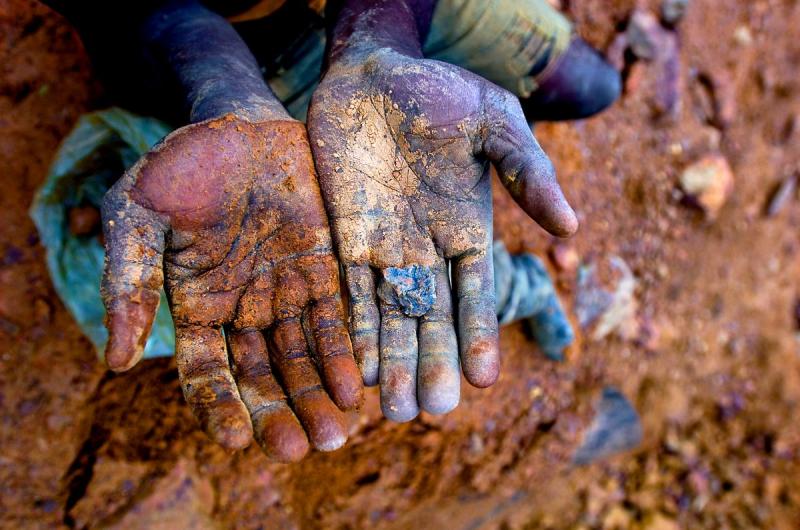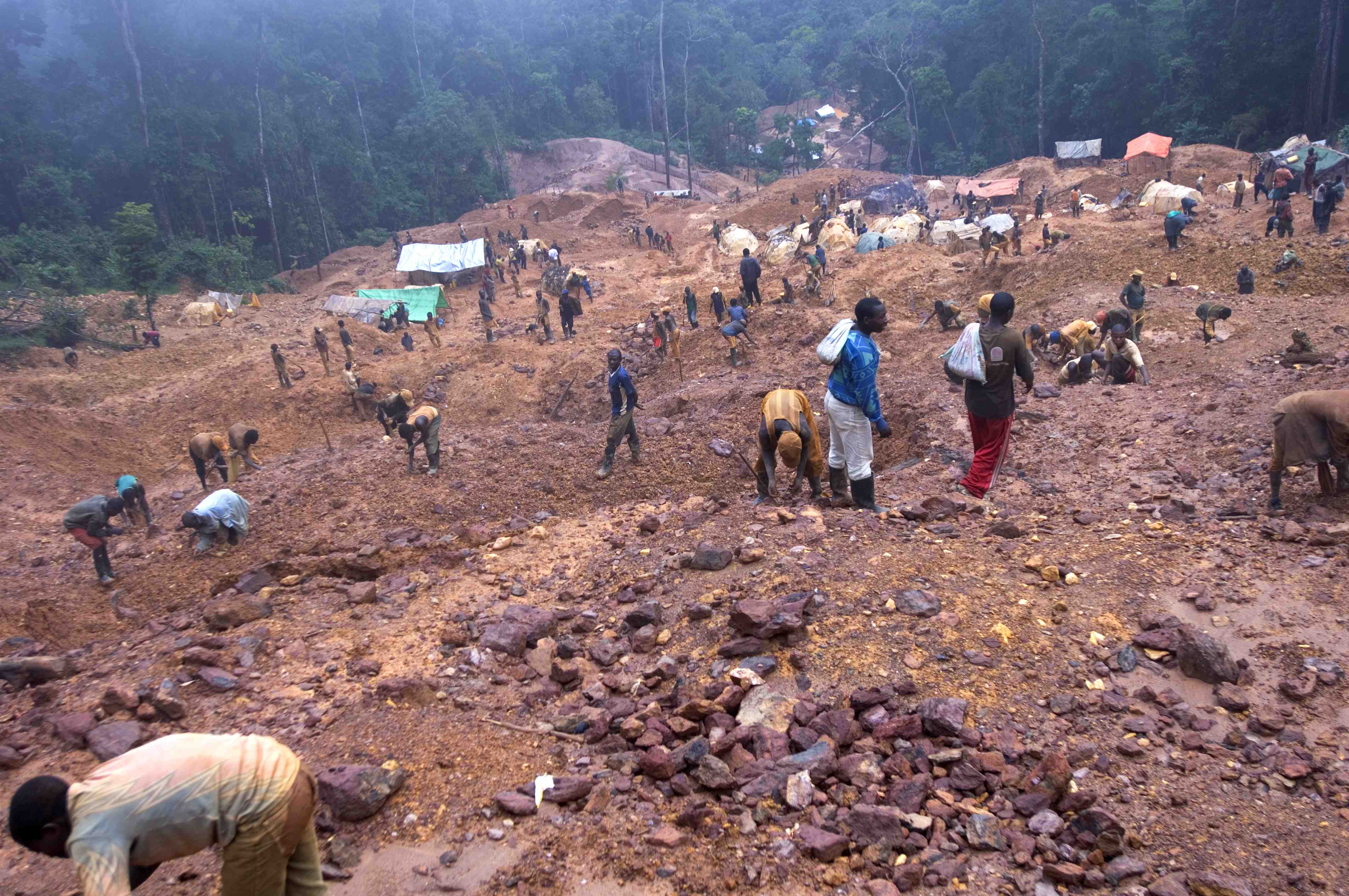Blood in the Mobile | reviews, news & interviews
Blood in the Mobile
Blood in the Mobile
Doc digs scarily deep into the cell-phone industry's human cost

Maybe it’s a quirk of night-filming that the minister’s eyes look blood-red. But the earth in the Democratic Republic of Congo is Martian too, especially near the hell-hole where many of the minerals that power our mobile phones and laptops are mined. Danish director Frank Piasecki Poulsen enters that hole, motivated it seems by unusually visceral guilt that, even in liberal Scandinavia, casually used electronic paraphernalia is linked to terrible crimes.
As we often half-hear, 5 million people have been killed in the last 15 years of civil war in the DRC; 300,000 women raped. This is death on the scale of the Holocaust. And the laptop on which I’m typing, and whatever you’re reading this on, likely contains the materials funding and fuelling the war. Poulsen goes to the headquarters of his own cherished mobile brand, Finland’s Nokia, and into the DRC, with polite stubbornness and crazy bravery, to bring these links alive.
The DRC is Conrad’s heart of darkness of course, the worst of Africa’s imperial nightmares, where Belgium’s bad King Leopold had slave-workers’ hands lopped off at the 20th century’s start. He became obscenely wealthy because rubber for the cars and bicycles we just couldn’t live without came from the old Congo. Poulsen proves that little has changed.
That Congolese minister with the seemingly bloody eyes is responsible for mining, and privately profits from it. A conflict of interest, surely, the Dane observes. No, an advantage, says the unabashed Kinshasa nabob: “I’m a scientist, and a businessman. Not a politician.” This vision of corruption waves him into the jungle interior. Amused or vain soldiers let him pass towards the Walikale mine “where,” a Congolese warns him, “they kill people... you can’t imagine what is going on, man”. Haunted and disgusted, he tells Poulsen anyway of a man being chopped up and his wife forced to lie on his pieces, his penis stuffed in her mouth, when she was raped for the first time. “Pay attention,” he says urgently, trying to wake the Dane to the danger he’s in.

With the help of a sad-eyed child miner, they go underground. They can’t stay long. Their lights play on a heaving mass of people, picks chipping with pathetic determination at rock, though there’s barely room to move. Cave-ins are common. One outraged man keeps hollering and lunging at them in the confined space with great threat, telling them not to film him. It seems obvious the film-makers, like their subjects, could be killed at any moment.
Poulsen doesn’t comment on his sweatily frightening experience. Unlike many first-person documentaries, the stoic Dane knows he isn’t the subject, but our journalistic guide. His point is that the miners who make it back up have their work ruinously “taxed” by marauding soldiers, who sell the minerals to fund their wars. These are the first steps in a chain ending in the products of Western electronics companies.
So Poulsen’s next stop is Nokia HQ. His trips there are equally memorable, as his polite but increasingly outspoken stubbornness gets him seen by equally polite Nordic apparatchiks, reasonably high in the building’s gleaming comfort. Their vague neo-liberal rhetoric, well meaning and perhaps believed, rings hollow because of what Poulsen’s seen. “You cannot reap the benefits of civilisation on the back of this," he argues. But corporations, and the Western wealth we’re used to, couldn’t exist without that disconnection, apparent in every mealy-mouthed word from these employees who can’t say anything else if they are to stay in their jobs, and can’t grasp what mass war crimes being laid at their door really means.
Poulsen offers a solution: a clear, published supply chain, from minerals’ first extraction to the mobiles we cheerfully text on. Nokia’s spokesperson weasels around the fact that this would be commercially disadvantageous. Meanwhile, the slaughter continues. This brave, compact documentary hopes consumer protest will stop it. Meanwhile, we diligently recycle our newspapers, and casually, needlessly junk and replace our electronic toys. There is a sort of madness here. This film gives it a face.
Watch the trailer for Blood in the Mobile
rating
Explore topics
Share this article
The future of Arts Journalism
You can stop theartsdesk.com closing!
We urgently need financing to survive. Our fundraising drive has thus far raised £49,000 but we need to reach £100,000 or we will be forced to close. Please contribute here: https://gofund.me/c3f6033d
And if you can forward this information to anyone who might assist, we’d be grateful.

Subscribe to theartsdesk.com
Thank you for continuing to read our work on theartsdesk.com. For unlimited access to every article in its entirety, including our archive of more than 15,000 pieces, we're asking for £5 per month or £40 per year. We feel it's a very good deal, and hope you do too.
To take a subscription now simply click here.
And if you're looking for that extra gift for a friend or family member, why not treat them to a theartsdesk.com gift subscription?
more Film
 Blu-ray: Wendy and Lucy
Down-and-out in rural Oregon: Kelly Reichardt's third feature packs a huge punch
Blu-ray: Wendy and Lucy
Down-and-out in rural Oregon: Kelly Reichardt's third feature packs a huge punch
 The Mastermind review - another slim but nourishing slice of Americana from Kelly Reichardt
Josh O'Connor is perfect casting as a cocky middle-class American adrift in the 1970s
The Mastermind review - another slim but nourishing slice of Americana from Kelly Reichardt
Josh O'Connor is perfect casting as a cocky middle-class American adrift in the 1970s
 Springsteen: Deliver Me From Nowhere review - the story of the Boss who isn't boss of his own head
A brooding trip on the Bruce Springsteen highway of hard knocks
Springsteen: Deliver Me From Nowhere review - the story of the Boss who isn't boss of his own head
A brooding trip on the Bruce Springsteen highway of hard knocks
 The Perfect Neighbor, Netflix review - Florida found-footage documentary is a harrowing watch
Sundance winner chronicles a death that should have been prevented
The Perfect Neighbor, Netflix review - Florida found-footage documentary is a harrowing watch
Sundance winner chronicles a death that should have been prevented
 Blu-ray: Le Quai des Brumes
Love twinkles in the gloom of Marcel Carné’s fogbound French poetic realist classic
Blu-ray: Le Quai des Brumes
Love twinkles in the gloom of Marcel Carné’s fogbound French poetic realist classic
 Frankenstein review - the Prometheus of the charnel house
Guillermo del Toro is fitfully inspired, but often lost in long-held ambitions
Frankenstein review - the Prometheus of the charnel house
Guillermo del Toro is fitfully inspired, but often lost in long-held ambitions
 London Film Festival 2025 - a Korean masterclass in black comedy and a Camus classic effectively realised
New films from Park Chan-wook, Gianfranco Rosi, François Ozon, Ildikó Enyedi and more
London Film Festival 2025 - a Korean masterclass in black comedy and a Camus classic effectively realised
New films from Park Chan-wook, Gianfranco Rosi, François Ozon, Ildikó Enyedi and more
 After the Hunt review - muddled #MeToo provocation
Julia Roberts excels despite misfiring drama
After the Hunt review - muddled #MeToo provocation
Julia Roberts excels despite misfiring drama
 London Film Festival 2025 - Bradley Cooper channels John Bishop, the Boss goes to Nebraska, and a French pandemic
... not to mention Kristen Stewart's directing debut and a punchy prison drama
London Film Festival 2025 - Bradley Cooper channels John Bishop, the Boss goes to Nebraska, and a French pandemic
... not to mention Kristen Stewart's directing debut and a punchy prison drama
 Ballad of a Small Player review - Colin Farrell's all in as a gambler down on his luck
Conclave director Edward Berger swaps the Vatican for Asia's sin city
Ballad of a Small Player review - Colin Farrell's all in as a gambler down on his luck
Conclave director Edward Berger swaps the Vatican for Asia's sin city
 London Film Festival 2025 - from paranoia in Brazil and Iran, to light relief in New York and Tuscany
'Jay Kelly' disappoints, 'It Was Just an Accident' doesn't
London Film Festival 2025 - from paranoia in Brazil and Iran, to light relief in New York and Tuscany
'Jay Kelly' disappoints, 'It Was Just an Accident' doesn't
 Iron Ladies review - working-class heroines of the Miners' Strike
Documentary salutes the staunch women who fought Thatcher's pit closures
Iron Ladies review - working-class heroines of the Miners' Strike
Documentary salutes the staunch women who fought Thatcher's pit closures

Add comment